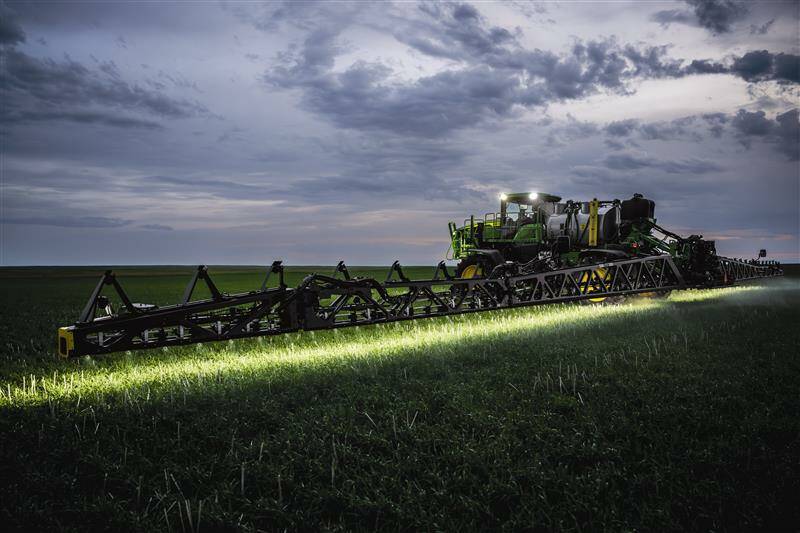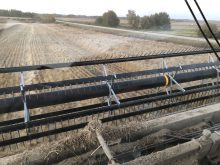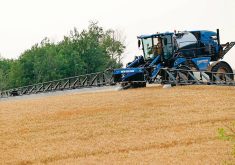Glacier FarmMedia – I’ve watched with interest in the last few years what’s considered ‘hot’ in the eyes of ag investors – and how quickly that interest fades and moves on to next trend.
One exception has been precision agriculture technologies. They remain a popular investment choice, and for good reason. But the alternative protein sector, particularly plant-based meats, is no longer as appealing as it has been in recent years.
However, interest in alternative proteins hasn’t really gone away. Investors now seem more interested in putting their dollars into how these proteins are created, specifically through the use of cellular agriculture and fermentation technologies.
Read Also

Deere expands spot spray system for small grains crops
John Deere says it has expanded the See and Spray system’s functionality to other crops. For the 2027 model year machines, it will be compatible with wheat, barley and canola.
This is fascinating, given that there are currently no commercially available food products created via cellular technologies, although more than 20 patent applications have been filed.
I believe the interest is likely being spurred by scalability, and perhaps less reliance on inputs. Plant-based meats require the use of pulses and other crops, plus some food chemistry magic to get a finished product that both tastes and looks good and has acceptable “mouth-feel.” Crop pricing and availability can swing wildly with market and environmental conditions, so growing ‘meat’ from a few cells and culturing them to make masses of product makes more economic sense in the long run.
But the technology is still relatively new. It’s expensive and there is concern over consumer acceptance and how Health Canada will regulate it. Venture capitalists can help reduce costs in the long-term; it’s the consumer acceptance and regulatory piece that will remain the wild card.
Artificial Intelligence (AI) is another investment trend pegged to watch in 2024. One report from Infopulse estimated the value of AI in agriculture in 2023 at US$1.7 billion, and predicts it will skyrocket to an estimated US$4.7 billion by 2028.
Precision agriculture technologies use multiple AI tools to gather, generate and analyze farm data and operate machinery and robotics autonomously. Further investment could help improve and drive these tools forward, but there is a fear factor to consider, particularly around the use of data.
[VIDEO] Futurist and innovation expert Jim Carroll talks about artificial intelligence in agriculture at Manitoba Ag Days on Jan. 17, 2024.
At the recent GrowCanada Conference in Calgary, John Weigelt, national technology officer for Microsoft Canada, likens AI to the “monster under the bed.”
“We don’t know what’s there, we don’t know what it is, but we’re scared of it,” he told attendees after taking a quick survey asking them how they felt about AI.
Although many indicated excitement, there was still a healthy number who raised their hands when he asked if it terrified them.
I wasn’t terrified of ChatGPT when it started becoming popular last year, but I definitely had concerns. Yet I was still very intrigued.
After playing around with it, I wasn’t worried anymore. It’s been a useful tool for translating information in other languages or coming up with headline ideas. It works fairly well for certain background research, but it’s not thorough enough for my liking since it just pulls what it can scan from other sources. But it can’t talk to someone in person and use experience to critically analyze what it’s reading. At least not yet.
AI tools need data constantly fed to them so they continue to get more accurate and useful. In farming, I’ve heard talk at conferences recently that the fear with AI is who owns the data, and what will be done with it?
These are valid concerns that AI companies will need to deal with as they continue developing their tools.
Another big factor is how the data is measured and reported. When approaching the Protein Industries Cluster to talk about how AI can help drive market development, Weigelt discovered “the soybean people don’t talk to wheat people (who) didn’t talk to corn people, and yet it’s the same soil that they’re using.”
Agriculture, like many industries, likes to operate in silos.
Investments will need to focus on how to break down barriers so data can be more useful, or the potential of AI will be lost.
– Kristy Nudds is editor of Farmtario.














